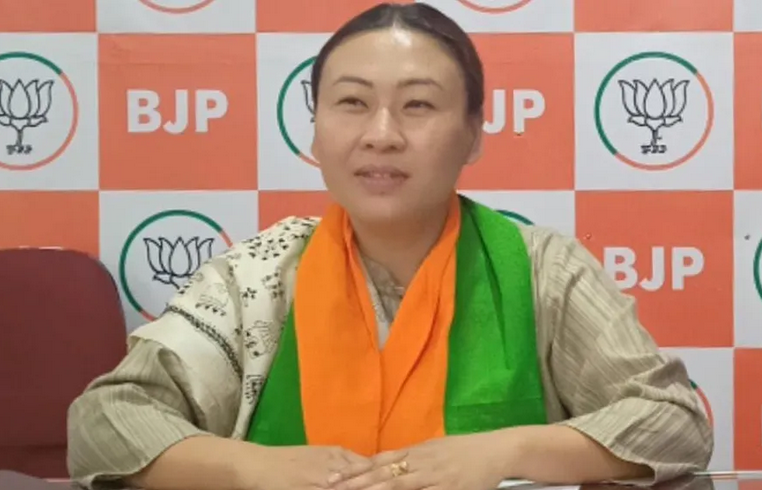
Nagaland women shine in all spheres, but find little space in politics
It took Nagaland 45 years to elect its second woman parliamentarian, and the state is yet to elect any woman in the 60-member Assembly

It took Nagaland 45 years to elect its second woman parliamentarian, a social enigma that manifests the existence of patriarchy in a different form in the state where female participation in decision making otherwise is much higher than the national average.
The wait for a woman parliamentarian ended last Thursday when BJP-nominee S Phangnon Konyak got elected to the Rajya Sabha unopposed. Before her, Rano M Shaiza was the only woman from the state who could make it to Parliament, often called the temple of democracy. The Late Shaiza was elected to the Lok Sabha as an independent candidate in 1977.
The state is yet to elect any woman in the 60-member Assembly. Only five females were in the fray in the last assembly elections in 2018. All of them lost, as women in Nagaland do not have much political space.
Whither gender equality?
The scenario is unlikely to change soon as strong reservation still exists in the state over the inclusion of women in the political realm, belying the hope of gender equality in politics generated by Konyak’s election to the Rajya Sabha.
“This is surprising in a state where participation of women in the workforce is quite noticeable, both in rural and urban areas. The crime rate against women in Nagaland is also one of the lowest in the country. The female literacy rate is also higher than the national average,” pointed out Atunu Phukan, a senior journalist who covered Nagaland for several years.
The National Family Health Survey – 5 showed that women in Nagaland enjoy full freedom to make their own decisions related to health, social movement, and participation in decision making. Nearly 90.7 per cent of the women in Nagaland make their own decisions or decisions jointly with their husbands, which is the highest in the entire country, the survey found.
The workforce participation rate for females in the state is 44.7 per cent as against 53.4 per cent for males, according to the 2011 census. The national average for females is 25.6 per cent.
Similarly, the female literacy rate in Nagaland at 76.22 per cent is higher than the national average of 65.46 per cent. The presence of women in government jobs in Nagaland is also quite high at 30.35 per cent, according to the annual administrative report of 2019-2020 of the state government’s economics and statistics department. What is more significant is that of the female government employees, 29 per cent are Class I officers.
Deeply rooted in traditional values
These statistics about gender equality did not, however, translate into political empowerment for women. This is largely because the Naga society is still deeply rooted in traditional values where gender roles are clearly demarcated. Domestic issues such as those related to family matters are essentially the domain of the women. Males are mainly entrusted with the larger roles of village administration.
In the village development boards, a Nagaland-specific statutory body that functions under the traditional village authority known as Village Council, 25 per cent seats are reserved for women. It is more symbolism and exists only on papers.
Male justification for the prevalence of this gender bias is that women themselves are not very forthcoming in taking part in politics.
“It is not that the tribal bodies are against women’s participation in politics. They themselves are generally reluctant to take leadership roles,” said HK Zimomi, president of the Naga Hoho, the apex body of the Naga tribes.
A contention not many Naga women endorse. “There is no level playing field for women in state politics,” said Monalisa Changkija, the editor of the Nagaland Page, and the state’s most forceful and respected woman voice.
Decision roll-back
The state erupted in violent protests in 2017 when the then Nagaland government wanted to reserve 33 per cent seats for women in urban local bodies. The objections mainly came from the male-dominated tribal bodies who argued that the reservation would infringe into the customary laws. The protests forced the state government to roll back its decision.
A renewed ray of hope for women was seen when a consultative meeting between the state government and the tribal bodies earlier this month gave the go-ahead to the reservation for women in civic bodies. The expectation further grew following the election of the BJP state Mahila Morcha president to the Rajya Sabha.
Despite the twin developments, the road to political empowerment of women in Nagaland would not be smooth. Already, the joint coordination committee, an umbrella body of several tribal organisations that spearheaded the 2017 stir against the reservation, has demanded of the state government to reconsider its decision to set aside seats in the ULBs for women.
“I would like to wait and watch. We have to see whether the government can withstand the opposition and actually conduct the civic body elections with the provision for 33 per cent reservation for women,” Chankija said.
More importantly, she added, even if the reservation is finally implemented, the beneficiaries should not be the wives, daughters and other relatives of established politicians.


